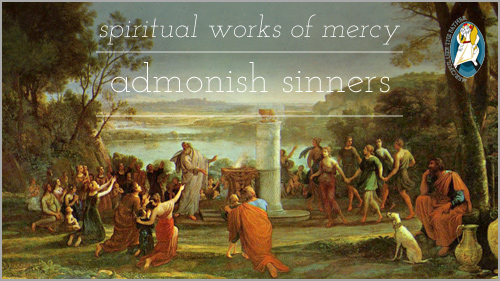 Any fraternal correction must be based on the two greatest commandments of love: “You shall love the Lord your God with all your heart, and with all your soul, and with all your mind.” This is the great and foremost commandment. The second is like it: “You shall love your neighbor as yourself.” Love of neighbor is the source and goal of correction.
Any fraternal correction must be based on the two greatest commandments of love: “You shall love the Lord your God with all your heart, and with all your soul, and with all your mind.” This is the great and foremost commandment. The second is like it: “You shall love your neighbor as yourself.” Love of neighbor is the source and goal of correction.
Secondly, a humble approach begets a listening ear. Fraternal correction is not an exercise in superiority. It is an acknowledgment of our sinfulness combined with the earnest desire for the recipient of the correction to come closer to God. When a Christian pulls another man or woman aside to “point out the error in his ways” it has to be for love of the corrected, and in a manner that makes it clear why the actions of the corrected are not in accordance with God’s law. It is not a comparison, a “holier than thou” moment, where a devout Christian corrects another by comparing that man or woman to himself. This is the quickest way to drive someone away from Christ, since all he associates with the Church is the pride of the Pharisee.
Third, any correction is best to be done on a one on one basis. This reality is reflected in the sacrament of confession, where the sinner is alone with the priest, acting in personae Christi, and confessing his/her sins directly to God. This is the first step in any rebuke, however mild. This allows for the Christian to express himself fully without the social stigma of loss of face that the corrected man or woman would possibly be exposed to. In the Gospel of Matthew, it is only after a one on one conversation is not effective that the situation calls for more people to be involved. Matthew writes, “‘If your brother sins against you, go and tell him his fault between you and him alone. If he listens to you, you have won over your brother. If he does not listen, take one or two others along with you, so that every fact may be established on the testimony of two or three witnesses.’” (Matthew 18:15-16)
The last part of Matthew’s exhortation seems to be extreme. “If he refuses to listen to them, tell it to the church. And if he refuses to listen even to the church, let him be to you as a Gentile and a tax collector.” (Matthew 18:17). This is final. It calls for the church to reject an unrepentant sinner, and there seems to be little hope for reconciliation. One and done.
While this is a harsh sounding doctrine, it is important to remember the context of the passage. The rejection of an unrepentant sinner is the culmination of a series of steps that Matthew has laid out for providing humble, loving correction to erring member of the Church. The mindset and pride of someone who has resisted all levels of loving correction will not allow him to remain an active Christian. It is the sinner rejecting the Church, rather than the Church casting someone out. This is, unfortunately, sometimes the only way that the correction can take place, and it is also a recognition that God’s word will not change, even for the most unrepentant person.
At the end of the day, holiness is found in humility; humble submission to God’s will; and an earnest, unselfish love of God, self, and neighbor.
